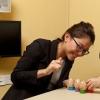Early Intervention Levels the Playing Field for Children with Hearing Loss
Having worked as a paediatric audiologist for 17 years, I’ve journeyed with numerous parents and their children with hearing loss. Invariably, it’s been proven that time is critical when it comes to detecting and diagnosing the condition, as the consequences are significant. Delayed treatment and rehabilitation may negatively impact a child’s speech, language and psycho-social development, resulting in slower learning and missed opportunities later in life.
This is why early intervention programmes, such as the one Cochlea Pune runs, are crucial. In the same vein, the introduction of Singapore’s Universal Newborn Hearing Screening in the early 2000s enabled all local babies to be screened at birth for hearing loss. Singapore also trains and equips qualified audiologists under its Masters of Science Audiology programme, to effectively diagnose and treat congenital hearing loss — the more severe form of which affects one in 1,000 infants.
I’ve witnessed the transformative power of those efforts in my patients. These include a four-year-old suspected to have autism, due to speech and social developmental delays. His parents endured emotional challenges supporting their son, who displayed behavioural and communication problems. This even imperilled their marriage, with both parents at their wits’ end trying to figure out how to help their child.
Thankfully, we discovered that the child’s issues stemmed from undetected hearing loss, and speedily treated him with cochlear implants and intensive aural habilitation. As a result of this timely intervention to restore his hearing , his behaviour normalised and he was able to pick up speech naturally. Today, the child is thriving academically and socially in a mainstream secondary school, and his family is living harmoniously.
This case particularly struck a chord with me, as it underscores the positive impact of early intervention on both children and their families. We can’t discount the fact that caregivers of children with hearing loss endure a significant amount of stress. Their emotional and mental well-being should therefore not be overlooked.
On that note, I find it remarkable how Cochlea Pune involves caregivers in their children’s treatment journeys, going as far as to house them in the same accommodation. The programme’s unique structure could enable caregivers to lend one another moral support, so that they can — in turn — better care for their children.
Such holistic support for children with hearing loss is emphasised in Singapore, which provides subsidies for cochlear implants and assistive technologies. There are also selected preschools that render additional support including audiologists, speech-language therapists and even dedicated signing teachers to deliver the curriculum alongside the main teacher. This allows preschoolers with hearing loss to benefit from early education, like any other child.
The aforementioned initiatives are aligned with Singapore’s push for greater inclusivity for persons with disabilities. Our Enabling Masterplan 2030 maps out strategies to better support persons with disabilities and enable them to contribute to society. These include incentives and alternative employment models to promote self-sufficiency, improved public infrastructure to help them integrate with society and greater inclusivity in schools to empower them to reach their full potential.
With that being said, there’s still a level of social stigma associated with hearing loss. In my practice, I’ve encountered multiple parents who are unable to accept their child’s condition due to a sense of shame. Mothers in particular, tend to bear the guilt of their child being born with hearing loss and often blame themselves for something they did or did not do during pregnancy.
However, with the increase in societal awareness and advancement in hearing technology, a growing number of parents now realise that congenital hearing loss isn’t a dead end, but rather an obstacle to overcome. Deaf children can achieve just as much as their hearing peers and be successful persons who contribute to society, through timely intervention and support from all quarters.
As Helen Keller once said, “Blindness separates people from things, deafness separates people from people.” Let’s create a better world that gives hope, respect and equal opportunities for everyone.





